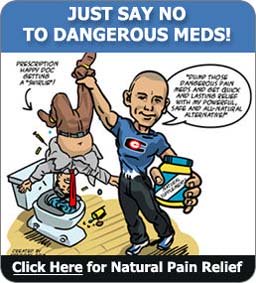Antidepressant Side Effects
Are a Neverending Trap
Are Antidepressant Side Effects a neverending trap? Many people believe that the withdrawals and other problems you might experience from taking antidepressants will, paradoxically, prevent many people from ever getting off of these drugs.
Studies have shown that about 50% of people taking antidepressants will experience negative side effects of antidepressants, and about 15-20% will experience withdrawal symptoms that may prevent them from getting off these drugs.
Drugs like:
- Prozac
- Celexa
- Lexapro
- Paxil
- Sertraline
are the second most commonly prescribed drugs in the US, with about 118 million prescriptions written every year, a tripling of the number prescribed just 30 years ago (1). That is a massive amount of antidepressant side effects and withdrawal symptoms.
Unfortunately, more and more doctors are also prescribing these drugs for ‘off-label’ uses, meaning that people do not even have to be depressed to get them. Just like the fact that about Half of all Antibiotic Use is Unnecessary; many, if not most, antidepressants are also being given unnecessarily.
Anyone taking or contemplating taking an antidepressant needs to read this page and research IN GREAT DETAIL the antidepressant side effects in order to make sure that the drug they are getting prescribed is a good idea for them.
The medical and mental health community is filled with doctors willing to write a prescription for antidepressants, even if they are unnecessary and potentially harmful, and even for children as young as toddlers!
Weight Gain From Antidepressants
Weight gain is one of the most asked about antidepressant side effects, but is it something that someone should worry about? The answer is probably more complicated than you would think.
Since there are more than one type of antidepressant, the results can be different with different classes of antidepressants and so, unfortunately, there is no way to say yes or no to the answer of whether antidepressants cause weight gain or not. Some of the antidepressants cause weight gain(2,),some cause weight loss, while some studies show mixed results with different antidepressants(10).
To make this even more complex, depression, in and of itself, can lead to weight gain (3) . So it’s difficult to know if it is the anti-depressants or the depression causing any weight gain.
Even more problematic is that different people’s bodies act in different ways depending upon their body chemistry, and science hasn’t figured out which factors might contribute to weight gain such that they can recommend particular anti-depressants depending upon a particular person’s body chemistry. While that kind of fine-tuning might be possible in the future, we’re definitely not at that point just yet.
Sexual Side Effects
Many people are concerned about having sexual problems when they take antidepressants. There is good reason for this since between 50-80% of people taking antidepressants experience decreased libido or some other form of sexual dysfunction(4). These kinds of problems can lead to a decreased quality of life for many which, ironically, is exactly what they are taking antidepressants to fix.

Fortunately, the side effects of antidepressants are different across the different classes of antidepressants, with these antidepressant side effects being far less with the class known as serotonin 2 blockers. Unfortunately, serontonin 2 blockers are some of the least used antidepressants. Ironically, it is the most prescribed antidepressants, the SSRI’s such as Prozac and Zoloft, that have the highest rate of sexual side effects.
For those who have chosen to take these antidepressants and do experience sexual side effects, fortunately, a study done on Ginko Biloba, a natural herbal product, proved to improve sexual side effects in up to 80% of those suffering from this drug side effect (5). And since Ginko’s most famous effects are for the improvement of brain function and concentration, taking this natural substance along with the antidepressants could actually be beneficial in several ways.
Bone Fractures and Osteoporosis
Are Antidepressant Side Effects
Anyone who ends up on an antidepressant is hoping that the drug will help them solve their mood issues and make them feel better. What they don’t expect, and are usually not told are that one of the long-term effects of these drugs can lead to higher risk of osteoporosis and bone fractures.
“This meta-analysis, which pooled results from
13 qualifying cohort and case–control studies,
found that SSRIs were associated with a
significantly increased risk of fractures.”
Selective serotonin reuptake inhibitor treatment
and risk of fractures: a meta-analysis of cohort
and case–control studies
Fortunately for those taking these drugs, it seems that getting off the drugs can stabilize and stop the bone loss, so that the risk is reduced back to normal after the drugs are discontinued for a year. As you’ll see in the next section, however, that may be more difficult than you believe, and may even be impossible.
The Trap of Withdrawal Symptoms
Withdrawal symptoms might very well be some of the worst of the antidepressant side effects because it keeps people in a ‘trap’. The symptoms they experience when they get off the antidepressants make them and their doctors believe that they need to keep taking the antidepressants, so they get back on and keep continuing this cycle of trying to get off.
Unfortunately, they end up being forced by their symptoms to stay on the drugs, even if the person never really needed the drugs in the first place, which, unfortunately, seems to happen on a regular basis to many who are prescribed these medications for minor non-psychological problems such as social anxiety and shyness.
While withdrawals symptoms have not been studied at length, there are enough studies that the medical community has actually given the withdrawals caused by one class of antidepressants the name of a syndrome(4).
Classified as Selective Serotonin Reuptake Inhibitor Syndrome, these SSRI’s, as they are known, include drugs such as paroxetine (Paxil) and fluoxetine (Prozac), some of the most commonly prescribed antidepressants on the market.
“Withdrawal from ... antidepressants... can produce
somatic and psychological distress. Influenza-like
syndromes, gastrointestinal adverse effects,
arrhythmias, anxiety, sleep disturbances, movement
disorders, mania or hypomania, panic attacks
and delirium may follow antidepressant withdrawal.”
Antidepressant Withdrawal Syndrome
Withdrawal symptoms, however, is a general antidepressant side effect that can occur with any of the classes of these drugs. In one class, MAO Inhibitors, stopping the drugs abruptly can even lead to death! There have even been cases of newborn infants experiencing side effects of antidepressant discontinuation after being born to a mother who was taking the drugs! (7) These symptoms are very real and can be extremely serious.
While studies are lacking, and no one has figured out a good way to decrease or manage these symptoms, there are a litany of horror stories on the internet from people trying time after time to unsuccessfully get off the medications. But the headaches, suicidal thoughts, anxiety, insomnia, fatigue, difficulty walking, sensations of electric shocks coursing through the body, and other problems often cause people to go back on the drugs in order to stop. Hence the trap of antidepressant side effects that often keep people on these drugs for years, sometimes for life. (8)
They Might Not Even Work
So, there are some problems with these drugs, it seems, but if they resolve depression, then they might be worth taking them in the long run, right? Well, whether they work or not is actually quite debatable.
Unfortunately, most of the studies we have on drugs is provided by the drug companies themselves, and the drug companies are under no obligation to publish studies that do not show favorable results for their drugs. Additionally, the FDA is often funded by the drug companies, giving an inherent conflict of interest for a drug to be approved, even if it does not work.
In the case of antidepressants, an intrepid reporter and a psychologist went about discovering the truth about antidepressant side effects and found the ‘hidden’ studies drug companies did not want the public to see and found that the effects of antidepressants are no better than placebo.
“They found that on average, placebos were 80 percent
as effective as the [antidepressants]. The difference between drug
and placebo was so small that it was unlikely to be
of any clinical significance. The results were much
the same for all six drugs: all were equally ineffective.”
Drug Companies & Doctors: A Story of Corruption
However, a doctor named Floyd E. Bloom, M.D did a review (9) of the above book with a scathing criticism stating that studies actually do show that antidepressants work in cases of moderate to severe depression; and that the studies showing they don’t work are often cases of college students with minor cases of depression.
As we pointed out earlier, these drugs are very often given to people who do not even meet the strict definition of ‘depressed’ and who should not have received the drugs in the first place This makes it even more terrible that someone who did not even need the drugs in the first place is subjected to the life-altering effects of these damaging and even dangerous antidepressant side effects.
As this site points out many times, doctors are NOT the authority in your health; you are. They are tools to be used in your ‘toolbelt’ of ways to improve your health, but their recommendations should be taken as such, and you should thoroughly research the pros and cons of any drug or medical procedure you are contemplating taking… BEFORE you take it. Do not take this responsibility lightly. Do your ‘due diligence’ on antidepressant side effects and make an informed decision that you can live with.
SOURCES
- CDC: Antidepressants most prescribed drugs in U.S.
- A record linkage study of antidepressant medication use and weight change in Australian adults
- Does Depression Cause Obesity?
- Incidence of sexual dysfunction associated with antidepressant agents
- Ginko Biloba for antidepressant induced sexual function
- Selective Serotonin Reuptake Inhibitor Antidepressant Treatment Discontinuation Syndrome: A Review of the Clinical Evidence and the Possible Mechanisms Involved
- Neonatal withdrawal syndrome after in utero exposure to selective serotonin reuptake inhibitors
- PAXIL AND ZOLOFT WITHDRAWAL SYMPTOMS WORSE THAN DOCTORS TELL YOU
- Floyd Bloom, MD Review of The Emperor’s New Drugs
- Antidepressants and Body Weight: A Comprehensive Review and Meta-Analysis





